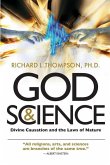The Kena Upanishad is one of the key texts in the Vedanta tradition, forming part of the Samaveda. It is a short yet profound work that explores the nature of the ultimate reality, or Brahman, and its relation to human consciousness. The Upanishad is presented as a dialogue between a student and a teacher, where the student seeks to understand the source of the mind's power and the essence of life itself. The central theme of the Kena Upanishad is the inquiry into the supreme cause behind all phenomena. The text begins with a series of questions: "Who is it that directs the mind? Who is it that gives life to the eye and the ear? Who is the power behind all the senses?" It addresses the apparent paradox that the mind, senses, and intellect, despite being instruments through which humans experience the world, cannot fully comprehend the source of their own existence. The Upanishad answers these questions by pointing to Brahman, the supreme, formless, and transcendent reality, as the ultimate cause of everything in the universe. The Kena Upanishad teaches that Brahman is not an object of sensory perception; it is beyond the grasp of ordinary cognition. It is the ultimate "Self" behind all beings, but it cannot be perceived through the usual channels of thought or sensory experience. The Upanishad uses metaphors, such as the story of the gods who are humbled by the power of Brahman, to illustrate that the divine is not subject to human understanding or limitations. The text emphasizes the importance of direct experiential knowledge (jnana) over intellectual speculation. By transcending the limitations of the mind and senses, a person can realize Brahman through deep meditation and introspection. Ultimately, the Kena Upanishad reveals that the highest knowledge is the realization of one's true Self, which is inseparable from Brahman, the absolute and all-pervading reality. The teachings of the Kena Upanishad encourage seekers to recognize the limitations of the intellect and the senses and to turn inward to experience the unity of the self with the divine. It remains a key philosophical work in the Vedantic tradition, providing timeless insights into the nature of existence, the self, and the universe.
Hinweis: Dieser Artikel kann nur an eine deutsche Lieferadresse ausgeliefert werden.
Hinweis: Dieser Artikel kann nur an eine deutsche Lieferadresse ausgeliefert werden.








